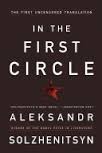The First Circle – Alexandr Solzhenitsyn – 1968
Reviewed by: D.W. Cymbalisty
This amazing story spans only a few days in the lives of several people that have been unduly imprisoned by Joseph Stalin’s secret police. Unlike the senseless waste and horror of the “gulag” these inmates find themselves in a relatively modern prison facility, where they quickly learn that they have been pragmatically placed to be exploited for their expertise. These inmates are mostly professional scientists or architects/engineers, and here (after they’ve been arrested under any number of false pretenses) they are forced to invent and develop elaborate electronic devices which will aid in the detection and arrest of other “subversives”. The main gadget they are called upon to produce is a “phonoscopy”… a device that will be able to accurately identify a person by examining recorded conversation.
 Right from the opening chapters Solzhenitsyn once again had me in his literal grip. For me, he is the master at capturing the foreboding sense of loss of freedom. Is it me, or the very page that seems to shudder as I turn it? It is palpable, and in some ways worse than outright murder… because you know that whatever happens to his characters, they are going to have to LIVE through it… they aren’t even afforded the luxury of dying. At one point he used the phrases “trampled yearnings” and “soaring passions” in one sentence and I felt that this summarized what all of his characters experience. For instance, in ch.34, the protagonist Gleb Nerzhin is musing with a fellow inmate on the hardships of imprisonment and he concludes that, of all his deprivations, by far the worst is the loss of freedom to be with his wife. She is allowed a visit once a year, and even then, he is not allowed to kiss her. Hearing of this, his cellmate Gerasimovich concludes that “there is probably only one path to invulnerability… to kill within oneself all attachments and to renounce all desires.”
Right from the opening chapters Solzhenitsyn once again had me in his literal grip. For me, he is the master at capturing the foreboding sense of loss of freedom. Is it me, or the very page that seems to shudder as I turn it? It is palpable, and in some ways worse than outright murder… because you know that whatever happens to his characters, they are going to have to LIVE through it… they aren’t even afforded the luxury of dying. At one point he used the phrases “trampled yearnings” and “soaring passions” in one sentence and I felt that this summarized what all of his characters experience. For instance, in ch.34, the protagonist Gleb Nerzhin is musing with a fellow inmate on the hardships of imprisonment and he concludes that, of all his deprivations, by far the worst is the loss of freedom to be with his wife. She is allowed a visit once a year, and even then, he is not allowed to kiss her. Hearing of this, his cellmate Gerasimovich concludes that “there is probably only one path to invulnerability… to kill within oneself all attachments and to renounce all desires.”
This book looks deeply into the process of passivity (the gradation of resignation) that creeps into and consumes the life of the imprisoned, but it also shows us the noble resiliency of the human spirit in the midst of numbing loss and regret (I am thinking of the unforgettable scene of Rubin following the guard in the night toward the end of chapter 67).
There is a passage in ch.84 which I think wonderfully capsulizes what the author is teaching us here in The First Circle:
“Unfortunately for people – and fortunately for their rulers – a human being is so constituted that as long as he lives there is always something more that can be taken away from him. Even a person imprisoned for life, deprived of movement, of the sky, of family, of property, can, for instance, be transferred to a damp punishment cell, deprived of hot food, beaten with clubs, and he will feel these petty extra punishments as intensely as his earlier downfall from the heights of freedom and affluence. To avoid these final torments, the prisoner follows obediently the humiliating and hateful prison regime, which slowly kills the human being within him.”
This particular author speaks with authority on these subjects, having been there. The world owes him a reading. His are never “happily ever after” books, and no-one flies away on a big elephant at the end of this one either… but somehow reading Solzhenitsyn, rather than depressing me, makes me appreciate simple things that are too often taken for granted. Things like… eating an orange when I want one, or going for a walk. We may be able to deny ourselves the luxury of exposure to Solzhenitsyn’s themes (by not reading him), but one thing we can not deny is that his books are based upon things that actually happened in history. Because they did. And they do! Here is one of the finest writers of the 20th Century, and this is his fictional magnum opus.














